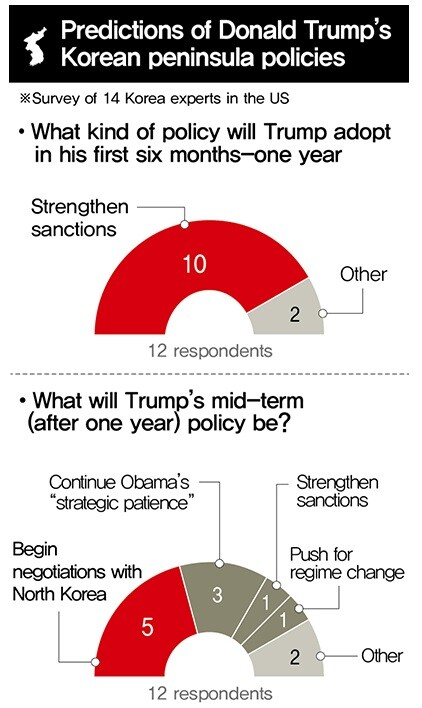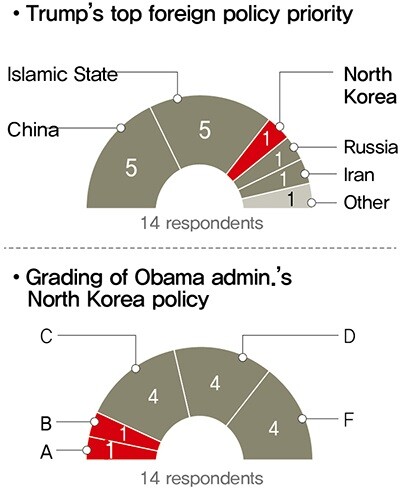hankyoreh
Links to other country sites 다른 나라 사이트 링크
US experts: In short term, Pres. Trump likely to strengthen sanctions on North Korea

American experts on Korean affairs mostly agree that, in the short term, the US administration of president-elect Donald Trump will continue the policy of putting pressure on North Korea, which could include imposing tougher sanctions. But there is considerable disagreement about what policies Trump might adopt toward North Korea six months or a year into his term. This shows just how much uncertainty there is about a Trump administration.
From Nov. 9 to 13, following Trump’s election as US president, the Hankyoreh carried out a survey of American experts on Korean affairs. When asked for their predictions about what North Korean policies the Trump administration would adopt in the short term, during his first six months to one year in office, 10 out of 12 experts who responded said that he would increase pressure on the North. Interestingly, both hardliners and pragmatists made the same prediction.
One of the experts who believe that Trump would increase pressure on North Korea is Fred Carriere, a professor at Syracuse University who is known for supporting dialogue and engagement with North Korea. Carriere worried that John Bolton, who served as UN Ambassador under the Bush administration, and former Speaker of the House Newt Gingrich are hardly likely to give Trump any other advice than pressure. Since Trump’s close associates are hardliners on North Korea, the argument goes, he is unlikely to adopt other policies early during his time in office.
Jae H. Ku, director of the US-Korea Institute at the Johns Hopkins University School of Advanced International Studies, pointed out that the new administration will have to demonstrate its strength and show that it is doing something.
“It’s the easiest choice for the Trump administration to make in the short term,” said another expert who spoke on condition of anonymity.

There was a profusion of views about the mid-term policy toward North Korea that the Trump administration will take between six months and one year after his inauguration, resulting in a split between the hardliners and the pragmatists. The response chosen by the greatest number of respondents (5 out of 12) was that the Trump administration would initiate negotiations with North Korea in the mid- to long term. Three respondents thought that Trump would perpetuate Obama’s policy of “strategic patience.” One expert thought that Trump would push for regime change, while another said he would resort to military force.
An expert at a progressive-leaning think tank predicted that Trump would start negotiations: “Trump could enter dialogue if he concludes that it’s more in the national interest or that maintaining the status quo and high tensions cost too much.”
A different view was offered by John Feffer, director of Foreign Policy in Focus. “Sanctions don’t work, no one wants military action and Trump doesn’t have the patience to negotiate with North Korea. In the end, the only approach remaining is maintaining the status quo,” Feffer said.
“While it depends on the situation, we can’t rule out the military option. It’s very unlikely that negotiations will take place,” Carriere said. An expert at one of the top four think tanks in the US also predicted that Trump might pursue a policy of regime change if North Korea does not deviate from its current course.
When asked about the foreign policy priorities for a Trump administration, five out of the 14 respondents said that China would be the highest priority, while five others said that IS (the Islamic State) would. Russia, Iran and North Korea were selected by one expert each, while one expert declined to respond. Most experts thought that the North Korea issue would be Trump‘s third priority (four respondents) or his fifth priority (five respondents).
“Trump has consistently said that his first foreign policy priority is destroying IS. The China issue, including China’s trade practices, which Trump has claimed are stealing American jobs, will probably be his second foreign policy priority,” said Dennis Halpin, a visiting scholar at the US-Korea Institute at Johns Hopkins University and a former advisor for the House Committee on Foreign Affairs.
An expert at a think tank who tends toward pragmatism explained his reasons for predicting that North Korea would be Trump’s third foreign policy priority as follows: “China will probably be the crux of security in Asia, and in that case, North Korea will play a key role in [US] policy toward China.”
When asked about US relations with China on issues including North Korea, eight out of 12 experts predicted that conflict will intensify. Two experts said that intensified conflict will lead to cooperation. One expert predicted a complex mixture of cooperation and conflict, while another was not sure.
Bruce Klingner, senior research fellow at the Heritage Foundation, expects that conflict between the US and China will get worse. “Trump has said that he will raise tariffs on Chinese products and that he will put more pressure on China to resolve the North Korean nuclear issue,” Klingner said.
“It’s just a guess, but I think the Trump administration will implement the secondary boycott law that Congress passed,” said an expert at a think tank focusing on the area of defense who expects US relations with China to deteriorate.
By Yi Yong-in, Washington correspondent
Please direct questions or comments to [english@hani.co.kr]
[%%IMAGE2%%]

Editorial・opinion
![[Column] Life on our Trisolaris [Column] Life on our Trisolaris](https://flexible.img.hani.co.kr/flexible/normal/500/300/imgdb/original/2024/0505/4817148682278544.jpg) [Column] Life on our Trisolaris
[Column] Life on our Trisolaris![[Editorial] Penalties for airing allegations against Korea’s first lady endanger free press [Editorial] Penalties for airing allegations against Korea’s first lady endanger free press](https://flexible.img.hani.co.kr/flexible/normal/500/300/imgdb/original/2024/0502/1817146398095106.jpg) [Editorial] Penalties for airing allegations against Korea’s first lady endanger free press
[Editorial] Penalties for airing allegations against Korea’s first lady endanger free press- [Editorial] Yoon must halt procurement of SM-3 interceptor missiles
- [Guest essay] Maybe Korea’s rapid population decline is an opportunity, not a crisis
- [Column] Can Yoon steer diplomacy with Russia, China back on track?
- [Column] Season 2 of special prosecutor probe may be coming to Korea soon
- [Column] Park Geun-hye déjà vu in Yoon Suk-yeol
- [Editorial] New weight of N. Korea’s nuclear threats makes dialogue all the more urgent
- [Guest essay] The real reason Korea’s new right wants to dub Rhee a founding father
- [Column] ‘Choson’: Is it time we start referring to N. Korea in its own terms?
Most viewed articles
- 1New sex-ed guidelines forbid teaching about homosexuality
- 2OECD upgrades Korea’s growth forecast from 2.2% to 2.6%
- 3[Column] Life on our Trisolaris
- 460% of young Koreans see no need to have kids after marriage
- 5Months and months of overdue wages are pushing migrant workers in Korea into debt
- 6[Guest essay] Maybe Korea’s rapid population decline is an opportunity, not a crisis
- 7Presidential office warns of veto in response to opposition passing special counsel probe act
- 8Is Japan about to snatch control of Line messenger from Korea’s Naver?
- 9Bills for Itaewon crush inquiry, special counsel probe into Marine’s death pass National Assembly
- 10Hybe-Ador dispute shines light on pervasive issues behind K-pop’s tidy facade